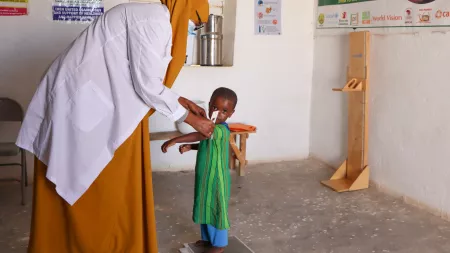Famine has been projected in parts of the Bay region in Somalia by food security experts, this follows four failed successive rainfall seasons, two desert locust infestations, and economic effects of COVID-19 lockdowns.
With more than one million people displaced across the country and another 7.8 million facing severe food insecurity, a UN OCHA report indicates that at least 200 children have died of undernutrition and disease in malnutrition centers. In clinics supported by CARE, health workers are reporting a significant increase in the number of children requiring treatment for malnutrition and the needs are fast outpacing resources. Access to water is becoming increasingly challenging as most water points have dried up and prices have spiked. This is forcing women and girls to travel long distances in search of this precious commodity exposing them to gender-based violence.
CARE has witnessed children dropping out of school as their parents need them to help search for food. Hundreds of schools across the country have closed due to a lack of water and population movement. Livestock rearing, which forms the backbone of most families' incomes, has died in their hundreds of thousands due to lack of water and pasture. Famine in Somalia will erode all the gains made in the past decade and a projected fifth failed rainfall season (October - December 2022) is going to be catastrophic to the already dire situation.
Diseases such as cholera and measles are on the rise due to a lack of food and water and health facilities are seeing more admissions of severely malnourished children under 5 and pregnant women. Between January and July 2022, the World Health Organization (WHO) reported 7,796 cases of cholera with 37 deaths. 53.5% of those affected were children below two years old. The FAO Food Security and Nutrition Analysis Unit warns that the acute malnutrition threshold for Famine has been breached in parts of the country.
Ardo, aged 60 years, used to make a living from her livestock, but now she has lost most of it due to a lack of water and pasture. “The only thing we could do was to sell our cattle when the market price was good. My family still owns about 100 sheep and goats. Before the drought, we owned more than 500. Most of them died because we could not give them water or food,” said Ardo.
"All my 300 goats have died of thirst. I usually live about 100 kilometers away from here. There is no water there anymore, so that is why I came here", says Aisha, who Aisha was displaced due to the drought and now lives in a hut outside a village. She is about 70 years old. "I don't remember how old I am, the drought has affected me mentally and physically so much that I cannot remember", Aisha continues.
“The humanitarian community put out various warnings and raised alarms over the past two years, yet we failed to avert a catastrophe, it is never too late to respond and save lives. We urgently need more flexible funding for the response in Somalia where half of the population is going hungry. One million people have already left their homes in search of food and water. 1.5 million children are at risk of acute malnutrition, and 230,000 people could die anytime due to starvation. They all need us to act right now, not later,” urges Deepmala Mahla, CARE USA Vice-President for Humanitarian Affairs.
Iman Abdullahi, CARE Somalia Country Director, warned “For families who endured the 2011 famine, another one will be a nightmare coming back to haunt them. We fear for women and girls who are always more impacted by such conditions. Women face more protection risks as they now must walk long distances to get water. Girls are dropping out of school and are at risk of harmful practices such as early marriages and Female Genital Mutilation. Our teams continue to record a spike in children being admitted for severe malnutrition in the health facilities we support.”
CARE is scaling up its response to the worsening humanitarian situation through assistance with water, sanitation and hygiene, health and nutrition, protection, and food and livelihood support in the form of cash and vouchers, so people can choose how best to prioritize their household finances.
For media inquiries, please contact Walter Mawere, CARE Somalia Advocacy & Communications Coordinator, [email protected].
